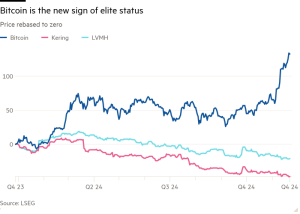Inside Democrats’ rush to sign up Pennsylvania’s crucial voters
As young people scurried head-down to their classes at the University of Pennsylvania last week, a group of other students intervened, pointing to a more urgent task.
“Are you registered to vote?” asked one, standing near a table on a buzzing thoroughfare on the Ivy League campus.
It is a pressing issue for the Penn Dems, as the campus Democrats are called, who are racing to sign up sympathetic students whose votes could decide America’s next president: Republican Donald Trump or their own candidate, Kamala Harris.
For some students it would be their first-ever vote — and one cast in the swing state at the centre of what both parties have billed as the US’s most momentous ever election.
“Everyone knows this state is the most important battleground,” said Ellie Goluboff-Schragger, a history student and Penn Dems’ president. “It’s not a hard sell,” she added, referring to the registration drive.

Harris and Trump have poured money and time into every corner of Pennsylvania in recent weeks, from the blue-collar counties around Pittsburgh in the state’s west to the Philadelphia suburbs within commuting distance of New York City.
“We have got to win Pennsylvania and we are going to win Pennsylvania,” Harris said this week on one of her many visits to the state.
“If we win Pennsylvania, we win the whole thing,” Trump said on another stop in the state on Monday. Next week he will hold a rally in Butler, near Pittsburgh, were a gunman injured him in an assassination attempt in July.
But while statewide polls gave Harris a single-point lead, the Democrats are struggling to match Trump’s registration drive.
Although Pennsylvania has more registered Democrats than Republicans the gap has narrowed from a 51-37 split in 2008 to 44-40 today. Last week, Republicans added 12,600 more people to their list, compared with about 8,000 for the Democrats. All told, Republicans have added a net 135,000 people this year and the Democrats just 38,000.
That offers an advantage for Trump in a state he lost to Joe Biden in 2020 by just over 80,000 votes — about the capacity of the Philadelphia Eagles’ NFL stadium.
“It’s classic grassroots,” said Christian Nascimento, chair of the Montgomery County Republican Committee, near Philadelphia. The party has reached into communities throughout Pennsylvania like never before, he said, and the economy, crime, immigration, fracking and national security have been effective motivating issues.
Many new Republican registrants were also “staunch supporters of Israel”, Nascimento added, and the party has had “more success than ever with Jewish voters”. It has also been siphoning off disaffected Democrats, he claimed.
The Republicans have also gained from efforts by groups such as Early Vote Action, led by hard-right activist Scott Presler, who supported attempts to overturn the results of the 2020 election.
Fighting back, Harris has drawn from a hefty campaign war chest to spend $170mn on advertising in Pennsylvania, compared with Trump’s $138mn. For both, it is far more than they have spent in any other battleground.
While Trump has focused on blue-collar voters in rural parts of the state, the Harris campaign strategy is to run up the vote — and the election day turnout — in the state’s solidly Democratic cities such as Philadelphia, which Biden won by a 64-point margin in 2020.
The Democratic students are doing their bit, enthused to be on the front line of an epic battle for the presidency.
“The opportunities we have are unparalleled,” said Lucas Eisen, a political- science student and the Penn Dems’ political director, referring to the significance of their vote in this election.
That has also put UPenn — whose Wharton business school Trump attended — in the political spotlight again, just months after its president resigned following accusations of antisemitism on campus.
Although the protests against the Israel-Hamas war often targeted the Biden administration, many progressive students are now focused on halting Trump.
“It would be devastating if we had another Trump presidency, for Muslims and Palestinians,” said Selma Farsakh Ulm, a Palestinian third-year student and Penn Dems’ diversity director. “It’s really important to get Arabs and Muslims out to vote.”

Other young Democrats cited the Black Lives Matter movement, student debt and school shootings as reasons to back Harris.
The group recorded a TikTok video riffing on a Trump clip. And while Farsakh Ulm insisted that “brat summer” was over, they played Charli XCX songs.
For all the enthusiasm, the registration session had modest success.
During the Financial Times’ two-hour visit, just one student had been recruited: Erin Hong, a finance major who had switched her vote to Pennsylvania from New Jersey, where Democrats have a comfortable polling lead.
“There’s a lot of competition,” said Steve Yang, a sophomore in international relations and the club’s communications director.

Harris’s campaign knows that even if it registers more voters, turnout on November 5 will be as important.
Across town in the Northern Liberties neighbourhood, near the Delaware riverfront, former congressman Bob Brady, who now chairs the city Democrats, was hosting one of his weekly planning sessions.
It was a glimpse of the older Democratic machine in action. Dirty food boxes lay on the floor of a nondescript office, the scene of a boisterous, pizza-fuelled salon to talk strategy.
Brady was upbeat. The Democratic national convention in August and Harris’s strong debate against Trump on September 10 — in Philadelphia — had given the vice-president momentum, he said. So had Taylor Swift’s endorsement.
Brady said the pop star’s decision to back Harris had prompted a burst of “4,000 or 5,000 registrations” across Pennsylvania.

Among Northern Liberties’ traditional Democrats, labour issues and the economy were bigger motivators than the progressive causes cited by the students. But they shared the Ivy Leaguers’ urgency to make sure Democrats of all stripes turned up on November 5.
“We know it’s going to be a turnout election,” said Louis Agre, a local political leader and head of a shipyard union. “We’re not really trying to convince people.”
The grinding machine-politics work would continue: recruiting volunteers, staffing phones, knocking on doors, printing forms and distributing signs.
The party’s bumper stickers and signage were visible across town, urging voters to “Vote Harris” and reminding Philadelphia’s Democrats to drive home their advantage in the city — or risk losing the whole state and likely the election to Trump.
“Obviously Harris is going to win Philadelphia,” said Frank DiCicco, a former city councilman. “But by how much?”
US Election Countdown
Sign up to our US Election Countdown newsletter, your essential guide to the twists and turns of the 2024 presidential election
#Democrats #rush #sign #Pennsylvanias #crucial #voters





